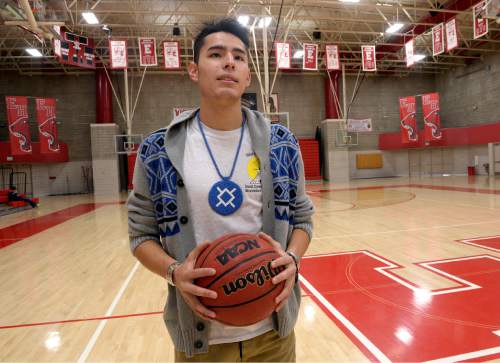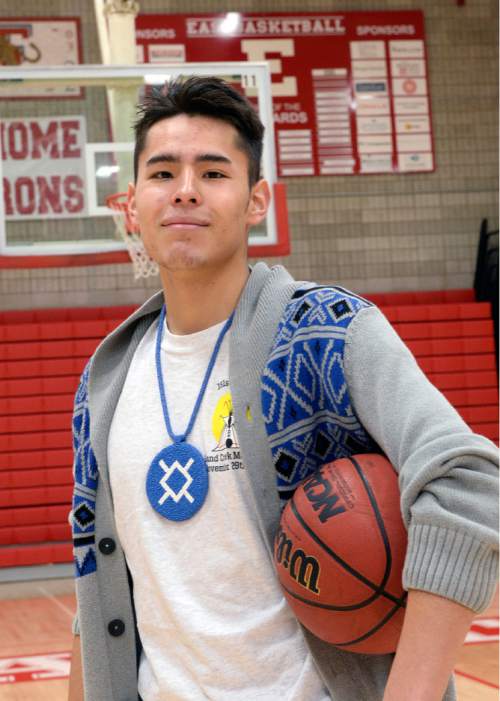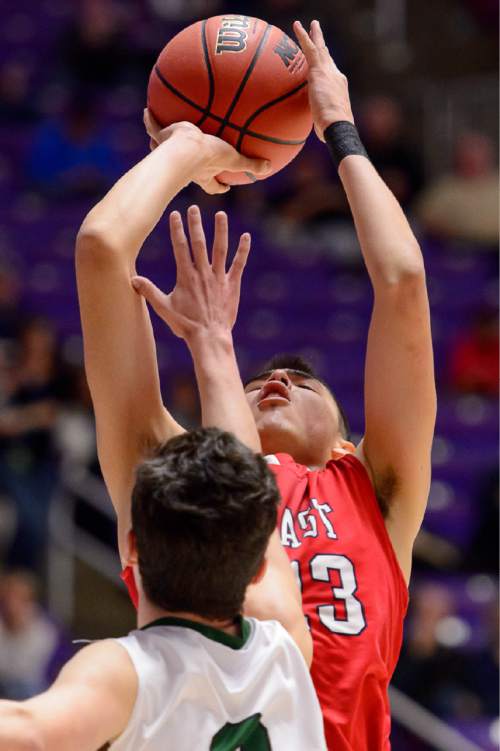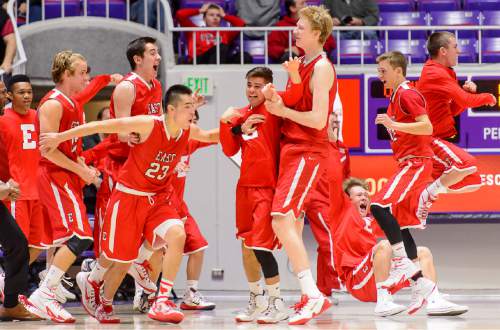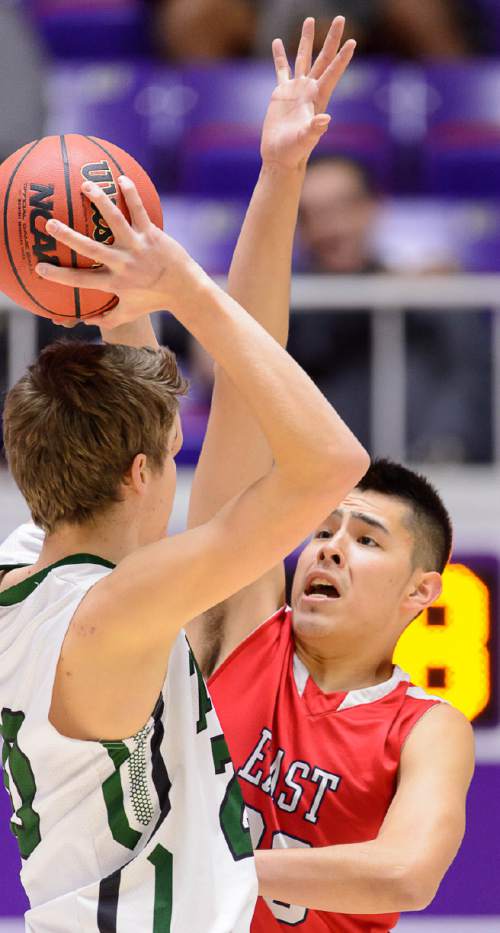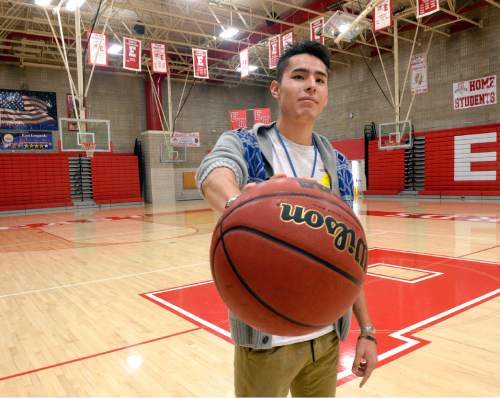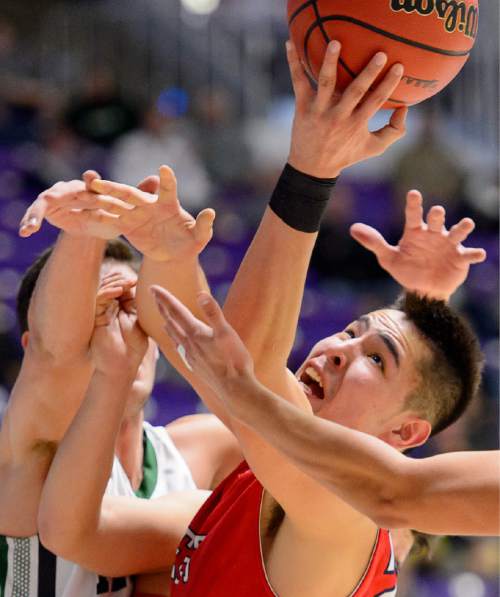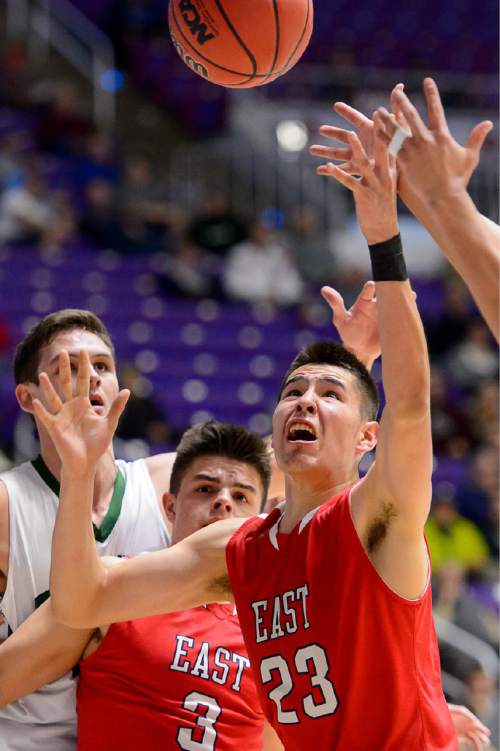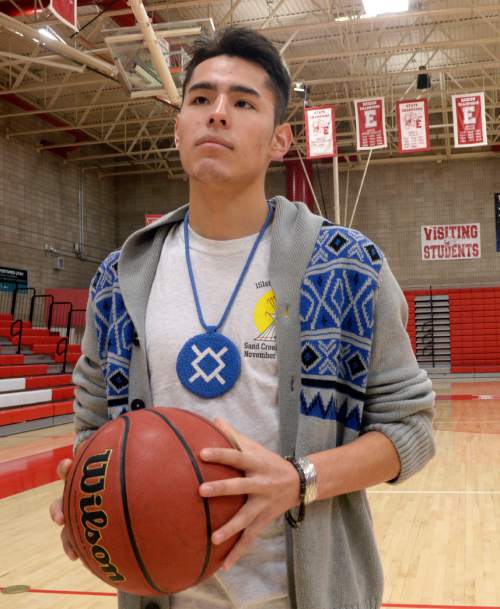This is an archived article that was published on sltrib.com in 2015, and information in the article may be outdated. It is provided only for personal research purposes and may not be reprinted.
The dirt road in Kiowa County is frozen. The green pigmentation of the surrounding scenery has withered into browns and golds. The Colorado sky is darkened and gray, leaving the presentation of a vast, dying land affected by the dropping degrees of late November.
It is here where 675 United State soldiers barbarically attacked the peaceful village of 700 Cheyenne and Arapaho Indians for eight hours, slaughtering 200 people — mostly women, children and the elderly — in what is now known as the Sand Creek Massacre.
East guard Dacian Spotted Elk is a direct descendant of the tragedy; his great-great grandfather, Charles, became an orphan after surviving the horrors of that evening as an infant. Now, 151 years later, Dacian and his family traveled to Colorado to participate in the 17th annual Healing Run the morning after Thanksgiving, paying homage to those who were not as fortunate on Nov. 29, 1864
"I was thinking about my family; what they've been through," Dacian says of the roughly seven-mile trek. "Finishing this race was going to bring positive energy."
Dacian embraces the history of his people. His mother, Daeina, is Navajo, and his father, Lamar, is Northern Cheyenne. As one of the state's bright, young local basketball talents this season, Dacian is using the hardcourt as an avenue of enlightenment into his proud heritage.
"Basketball is being in a group of people. That's what being Native to me is — being a part of something more than yourself," Dacian relates. "… I get goosebumps every time I hear my name announced in the starting lineup. It's so special to have such a sacred name. It's very touching to me, and I want to represent [my family] in a special way."
Charles Spotted Elk fought in the Battle of Little Bighorn 12 years following the Sand Creek Massacre before settling in the Northern Cheyenne Indian Reservation in Lame Deer, Montana, where a large, majestic elk roamed. Despite several attempts, no one could kill the animal. "It was untouchable," Dacian explains. After surviving the atrocities of his childhood, Charles was given the name "Spotted Elk," symbolizing his strength and perseverance.
Those enduring characteristics accompanied each generation of the Spotted Elk family. Navitt Spotted Elk, Dacian's grandfather, attended a boarding school that tried to strip him of his name and culture. He refused to surrender to oppression, and instead discovered basketball as an outlet. "He's a legendary player in Lame Deer," Dacian says. The sport provided opportunities, including for his father, who played at Bacone College in Muskogee, Okla.
At 6-foot-4 and 194 pounds, Dacian is averaging 22.1 points, 5.9 rebounds and 2.4 assists per game for the 7-2 Leopards, and he hopes to follow in the footsteps of his father. He has interest from several college programs, but no official offers currently.
"Anytime you go to the next level, there are going to be guys with similar skill sets," said East coach Skip Lowe, who believes Dacian's game translates to college. "With him being a bigger point guard — I think that's going to make him real versatile. He can play a number of positions."
Dacian has yearned to play in college since he was 5 years old while living on the Navajo reservation in San Juan County, which he says was overrun with poverty and crime, before moving to Salt Lake City when he was in second grade. Basketball, much like those before him, created possibilities, specifically integration into the social chain.
"I don't think I knew very many Native Americans growing up here. It was kind of tough, trying to adjust to that," Dacian says. "Basketball is actually how I got friends. I joined a little league team, and that's where I took off."
Being a minority is no longer intimidating but rather a pathway to conversation for Dacian. He explains the importance of the Morning Star symbol adorning the medallion he wears to inquisitive peers. "The Cheyenne people were trying to escape captivity and being enslaved, and they'd look up and see the North Star. Following that star was a way of hope."
He describes cultural traditions and practices, compares social similarities with friends, and denounces wrongful, misguided prejudices, including the "Native-American-over-the-mouth chant" and an occasional racial slur from opposing fans. The fortitude Dacian has displayed is emblematic of his family throughout their history.
"My mother tells me all the time, 'You have to ignore it,' " Dacian explains. "You have to play through it because when you let it get to you — you're letting them win. I choose to ignore it."
The traits Dacian exhibits, whether they be academics, athletics or awareness, are what Lowe described as examples of a "natural leader" for a program with championship aspirations. Lowe also says, "one of the neat things for me, is I've noticed him growing into his culture. When he was first here, he didn't shy away from those things, but he's really embraced his culture, and it's been really fun to see him grow with that."
Soon, "when it's a little warmer," Dacian says, he will further his maturation. Known as Howeche, his tribal name meaning Thunderbird, he will venture to his reservation in Montana for three days of fasting. He will be rewarded with a vision and a sacred name.
When he returns home, his journey to manhood will be complete, signifying, he hopes, the beginning of the next stage of his life:
College.
Twitter: @trevorphibbs —
About Dacian Spotted Elk
School » East
Class » Senior
Position » Guard
Height » 6-foot-4
Weight » 194 pounds
Noteworthy » Spotted Elk is averaging 22.1 points, 5.9 rebounds and 2.4 assists per game for the 7-2 Leopards this season. He's using basketball as an opportunity to bring enlightenment to his Native American heritage.


